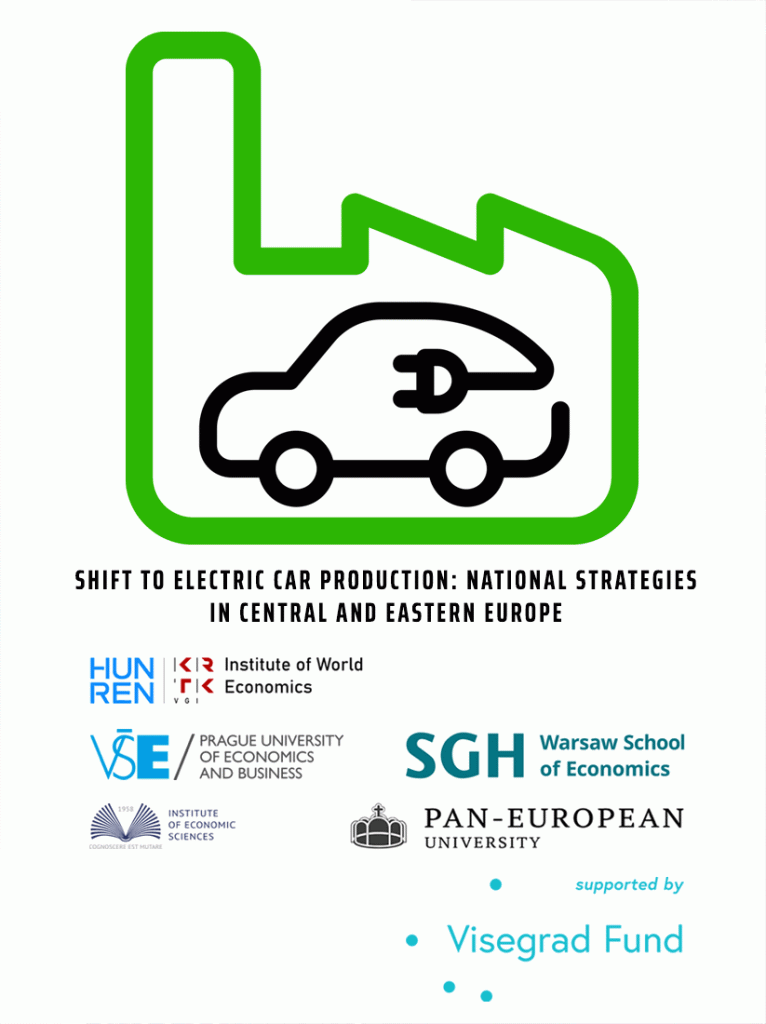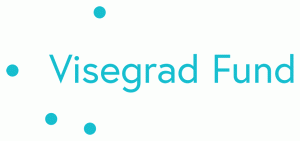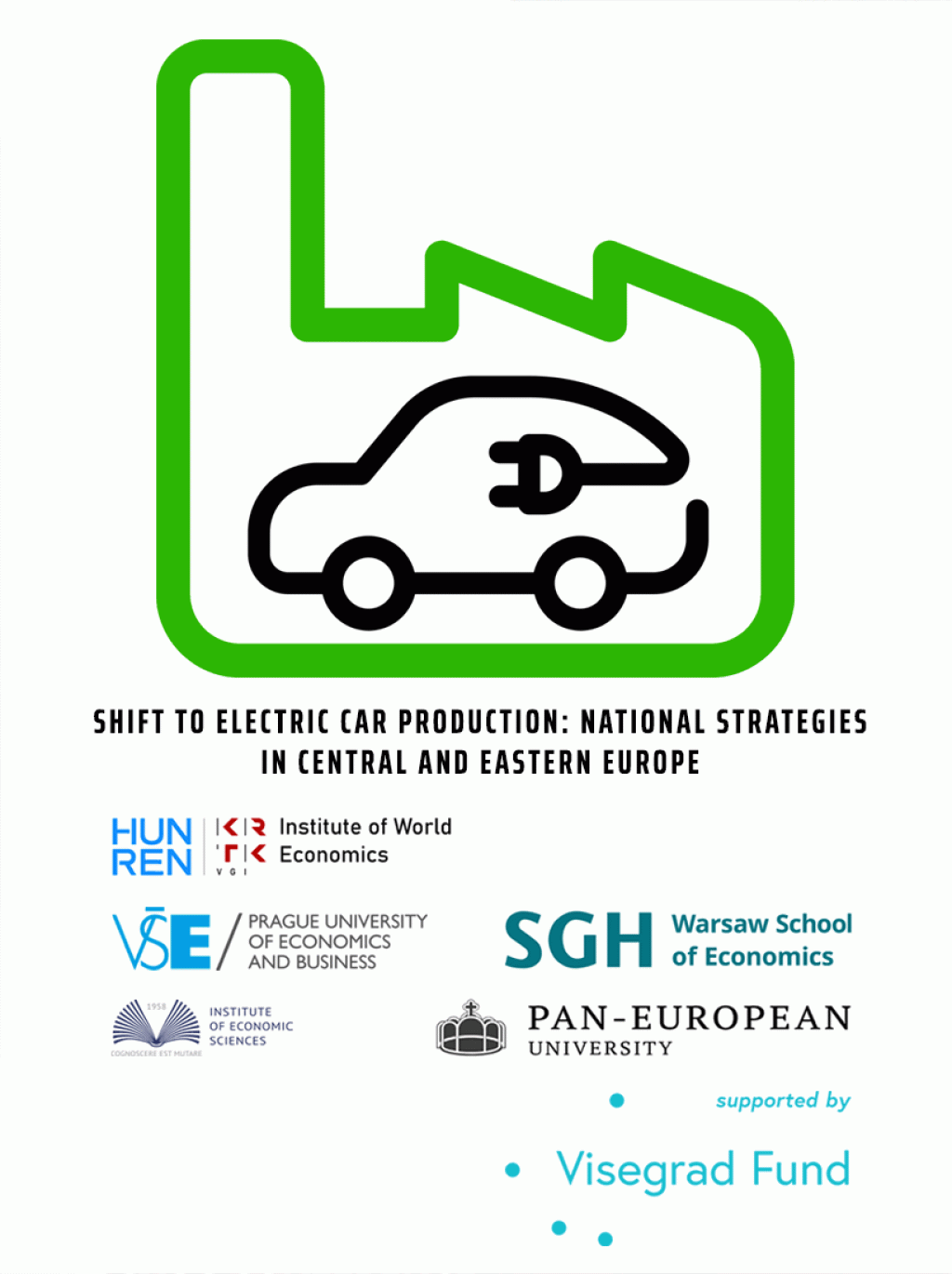Shift to electric car production: national strategies in Central and Eastern Europe
Leader of the project: HUN-REN CERS, Institute of World Economics, Hungary
Head of the project: Gábor Túry (HUN-REN CERS Institute of World Economics)
Implementation period: 2024 – 2025
This research project supported by
PROJECT PARTNERS
Prague University of Economics and Business, Czechia – WEBSITE
SGH Warsaw School of Economics, Poland – WEBSITE
Institute of Economic Sciences, Serbia – WEBSITE
Pan European University, Slovakia – WEBSITE
ABOUT THE PROJECT
Efforts to reduce carbon emissions in road transportation are creating new challenges for Europe’s automotive industry. Substantial investments are made to meet the European Commission’s roadmap, particularly in addressing the gap in electric vehicle (EV) battery development and production. Central Europe is at the forefront of these efforts, attracting significant investments from EV battery manufacturers, as the Visegrad 4 and Serbia (V4+S) play a significant role in European automotive production. However, foreign investors in V4 countries prioritise short-term gains over long-term strategies, maintaining assembly-based roles rather than advancing higher-value activities. Similarly, Serbia’s automotive industry has expanded primarily through foreign investments, albeit with limited added value due to the predominant role of assembling complex components imported from abroad. Therefore, the main issue the project focuses on is improving the position of V4+S in minimising the existing assembly-based role and implementing more high-value activities of the automotive industry value chains.
In connection with this, the following questions arise: • What are the key investment trends in response to EV technological transitions in V4+S? • How have changes in the automotive Global Value Chain affected regional industry dynamics? • What are the similar and different opportunities and challenges in the EV technological transition in V4+S? • What policy recommendations can be derived to implement more high-value activities in V4+S?
To answer these questions, we will identify threats and opportunities by exploring automotive value chain transformations related to the decarbonisation process. Furthermore, we will examine how governmental strategic goals are fulfilled. With the help of interviews with the stakeholders, statistical and documentary analysis we will provide a detailed picture of the automotive industry’s transition process in each country. During the project implementation, we will perform the following activities: • Analysis and comparison of investments related to technological transition in the automotive industry; • Identification and examination of changes and upgradings in the automotive value chain; • Semistructured interviews with companies and stakeholder representatives, such as industry associations, trade unions, clusters, chamber of commerce, etc.; • Identification and analysis of strategies of selected individual countries; • Elaboration of case studies on sectors, countries and companies; • Preparing scientific articles; • Formulation of public policy recommendations; • Communication of the project outcomes through conference presentations, university lectures, scientific articles and in the final project report; the elaborated case studies will serve as a basis for discussion in university seminars within the Doing Business in the Globalized Environment course at Prague University of Economics and Business, the EU Internal Market at the SGH Warsaw School of Economics. Dissemination of all project research findings and topic-related updates through social media, events and relevant news outlets.
DISSEMINATION/OUTPUTS
Conferences/Workshops
Date: October 29, 2024
Venue: HTK, 1097 Budapest, Tóth Kálmán u. 4., Hungary / Grounf Floor Room K. 11-12.
‘State policies on the buildout of electric car production in CEE countries’
Date: May 9, 2025
Venue: Institute of Economic Sciences, Zmaj Jovina 12, 11000 Belgrade, Serbia
Final Conference: ‘SHIFTing Gears: The Future of Electric Car Production in CEE Countries’
Research papers/Publications
Andrea Éltető (2024). Why Is It Different? Specific Characteristics of the Hungarian Battery Industry: Legal Background and Environmental Impacts
In: HUN-REN CERS, Institute of World Economics, Working Paper Nr. 276 (2024) August 2024
Andrea Éltető (2024). Iparbiztonsági kockázatok a magyar akkumulátorgyártásban és az ezzel kapcsolatos kommunikáció
In: Külgazdaság, 68:2024/9-10, 31-69.
DOI: https://doi.org/10.47630/KULG.2024.68.9-10.31
Andrea Éltető (2024). Industrial safety risks in the Hungarian battery industry and related communication
In: HUN-REN CERS, Institute of World Economics, Working Paper Nr. 278 (2024) November 2024
Petar Mitić, Isidora Beraha (2024): Strategic Pathways for EV and Battery Production in Serbia
In: HUN-REN CERS, Institute of World Economics, Working Paper Nr. 279 (2024) November 2024
Tomáš Dudáš (2024). Government Strategies for the Transition to Battery Electric Vehicles Production in Slovakia
In: Olha Brynko, Rostyslav Karakash, Radovan Kopál, Sabina Lacušová, Iryna Taliian and Eva Vlková (eds.) International Economy, Politics and Law in 2024: Trends, Challenges, Perspectives, International Scientific Conference, Vydavateľstvo Ekonóm, pp. 116-123.
Gábor Túry (2024). Szerbia mentheti meg az európai autóipart? Superman kristályához hasonló ásvány segíthet ebben. [Serbia can save the European car industry? A mineral like Superman’s crystal could help] Portfolio KRTK blog, December 30, 2024
Judit Ricz, Andrea Éltető (2025): Paradoxes of Green Transition and Developmentalism: The Case of EV Battery Production in Hungary
In: Problems of Post-Communism, 1–15.
DOI: https://doi.org/10.1080/10758216.2025.2459268
Press coverage/Articles
HVG.hu (Hungarian online news portal)
Fejlesztési kényszer, lyukra futás, visszaszorulás: óriási kihívásokról vallottak az elektromosautó-iparba bekapcsolódni akaró magyar beszállítók (Development pressure, running into a dead end, being pushed back: Hungarian suppliers wanting to join the electric car industry spoke of enormous challenges)
Based on the experiences of potential suppliers in Hungary, the transition to electric vehicle (EV) manufacturing often seems more like a struggle. A recent Hungarian study assessed the possibilities and realities of companies’ involvement in the EV industry.
Conference presentations
Tomáš Dudáš: Government Strategies for the Transition to Battery Electric Vehicles Production in Slovakia
International Economy, Politics and Law in 2024: Trends, Challenges, Perspectives. International Scientific Conference. University of Economics in Bratislava, Faculty of International Relations
Bratislava, Slovakia, November 29, 2024.
Andrea Éltető: Dependency combined with illiberalism: differences in Central European EV battery production
Comparative economic systems in the era of geo-economic fragmentation. 18th Biannual Conference of the European Association for Comparative Economic Studies – EACES
Belgrade, Serbia, September 12-14, 2024.
Andrea Éltető: Risks of new industrial policies in the semi-periphery: the electric vehicle sector in Hungary
20 years in the European Union: Catching up, territorial policy and inequalities. MRTT annual conference, University of Szeged Faculty of Economics and Business Administration
Szeged, Hungary, October 17-18, 2024.
Andrea Éltető: Dependency combined with illiberalism: differences in Central European EV battery production
The Changing Global Economic and Business Environment: Policy Challenges. 10th The Role of the State in Varieties of Capitalism (SVOC) International Conference
Budapest, Hungary, November 14-15, 2024.
Andrea Éltető: Charging Resistance :The Rise of Civil Protests in Hungary’s EV Battery Industry
Green and digital transition. The 7th Conference in cooperation with the European Association for Comparative Economic Studies
Szeged, Hungary, June 18-20, 2025.
Gábor Túry: State strategies for the transition to BEV production – the case of Hungary
Globalisation, integration, cooperation – what is at stake in the current turbulent times? The 6th Conference in cooperation with the European Association for Comparative Economic Studies
Szeged, Hungary, March 22-23, 2024.
Gábor Túry, Andrea Éltető, Tamás Szigetvári: Hungarian government strategy for the transition to BEV production – what do the real policies show?
EADI conference: Views on development from the peripheries of Europe. HUN-REN CERS IWE – EADI
Budapest, Hungary, May 16-17, 2024.
Gábor Túry: Environmental sustainability in automotive upstream activities – Corporate strategies and reality in the European EV supply chain
Central and Eastern Europe in the Changing Business Environment. 24th International Joint Conference University of Economics in Bratislava
Bratislava, Slovakia, May 23-24, 2024.
Gábor Túry, Andrea Éltető, Tamás Szigetvári: Hungarian government strategy for the transition to BEV production – what do the real policies show?
The Changing Global Economic and Business Environment: Policy Challenges. 10th The Role of the State in Varieties of Capitalism (SVOC) International Conference
Budapest, Hungary, November 14-15, 2024.
Gábor Túry: What Opportunities does the Technology Shift Offer? Government Policies on the Buildout of Electric Car Industry in Hungary
XIV. International Conference Challenges in the New Era of Globalization (GLOBERA). Institute for World Economy
Bucharest, Romania, December 4-5, 2024.
Gábor Túry: Átállás az elektromos autógyártásra: a magyarországi autóipari beszállítók lehetőségei
Műhelybeszélgetések. HUN-REN KRTK Világgazdasági Intézet
Budapest, Hungary, June 10, 2025.
Gábor Túry: Az európai autóipar versenyképessége a jelenlegi átalakulások idején
Soha nem látott átalakulás az autóiparban. Portfolio konferencia Signature Online Klub
Budapest, Hungary, June 10, 2025.
https://www.portfolio.hu/rendezvenyek/klub/soha-nem-latott-atalakulas-az-autoiparban/1887/program
Gábor Túry: Prospects for Hungarian suppliers in the transition to electric car production
Green and digital transition. The 7th Conference in cooperation with the European Association for Comparative Economic Studies
Szeged, Hungary, June 18-20, 2025.
Petar Mitić, Isidora Beraha: Government subsidies for electric and hybrid vehicles in Serbia and the region
4th Visegrad Conference, HUN-REN CERS, Institute of World Economics
Budapest, Hungary, June 24, 2024.
Petar Mitić: Lithium mine in the Jadar Valley, Serbia
Possibilities and dangers of the EU’s and Hungary’s Battery Strategy, Civil EU Presidency 2024.
Budapest, Hungary, November 22, 2024.





